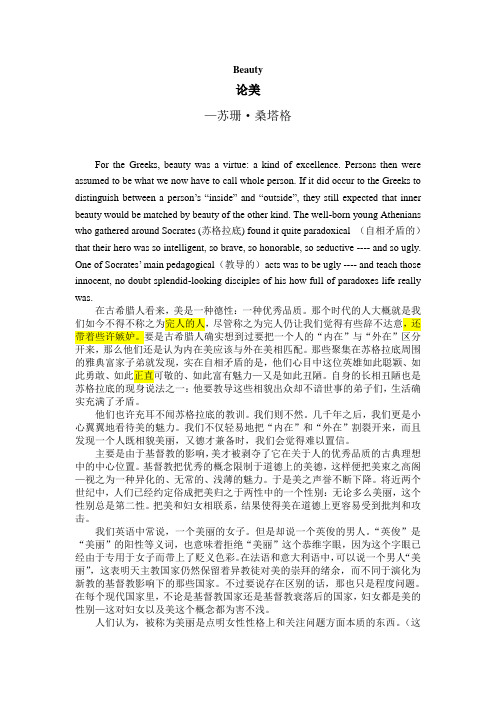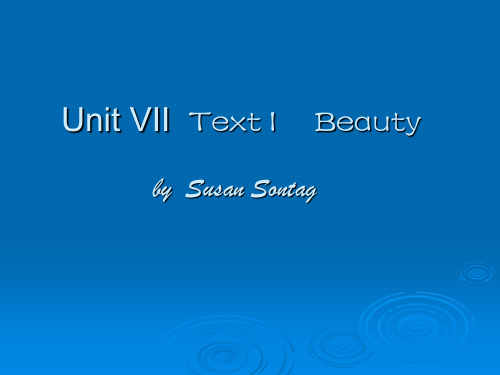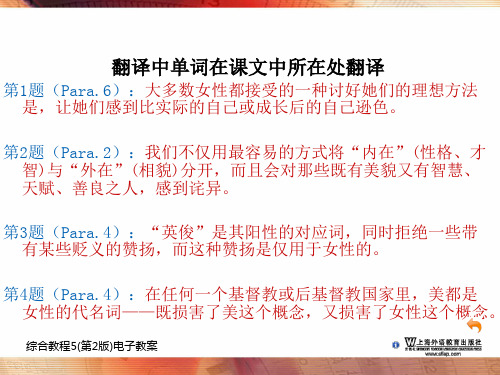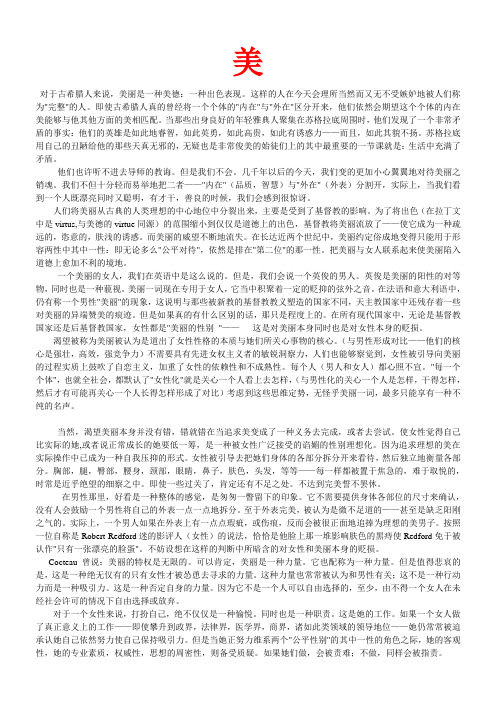Susan Sontag 《beauty》译文
英文经典欣赏

感动电影:《当幸福来敲门》:看完后能使人有不一样的感受,是一部让看他的每一人落泪你刚刚拿到大学文凭,雄心勃勃,希望在事业上大展身手,可是找工作的过程渐渐泯灭了你的雄心,四处碰壁后该怎么办?这时候,看这部片子。
《肖申克的救赎》:毫无疑问是一部好片子,没有动作,没有特技,甚至没有美人,却依然能深深打动观众,并且历经十几年而魅力不减。
“有一种鸟儿是永远也关不住的,因为它的每片羽翼上都沾满了自由的光辉。
”一个人能够在十五年痛苦的牢狱生活里,不放弃对自由的向往,这是一种怎样的精神力量?所以他成功了成功夺回了自由。
《肖申克的救赎》中有这样一句话:体制化是这样一种东西,一开始你排斥它,后来你习惯它,直到最后你离不开它。
想想看,我们的身体已经有多大一部分被体制化了?《奔腾年代》:一个不甘寂寞的商人,从自行车配件维修、到销售汽车、再到经营马匹,本身他就是一个社会发展的缩影、一个努力不息的形象,自身的经历成为他演讲有力的支持与鼓励。
《死亡诗社》:名字容易让人误解,其实这不是一部充满死亡气息的电影。
在这里,没有普拉斯那样的女人故事,也没有阴冷刺骨的文字。
相反,这应该归类于校园青春剧。
在这个严谨的威尔顿教会学校(男校)有着这样的四个口号,传统,荣誉,纪律,优秀。
校园里,有这样一群俊美如阿波罗的男孩。
他们的眼中闪着好奇的光芒,对爱和异性的憧憬,挣扎着奋起的力量,向往一次不计代价的独立的飞翔。
《美丽人生》:女主角嫁给了一个深爱自己的犹太人,为了这份爱,她放弃了优越的生活,甚至不在乎生命.丈夫虽然在集中营里丧命,爱却不会消亡.何况还有儿子相伴.《忠犬八公的故事》:主人公李察基尔偶然捡到这只可爱的狗儿,并与其成为朋友。
八公长大以后,学会了每天到车站去送主人公上班和等主人公下班,寒暑易,风雪打,八公一直坚持着。
某天,主人公心脏病突发,在工作的教室里去世,然而八公却不知道它的主人已经无法再回来,依然每天去等主人公,这一等就是10年。
最新新编英语教程6-U7-Beauty-中英翻译

BeautySusan SontagFor the Greeks, beauty was a virtue: a kind of excellence. Persons then were assumed to be what we now have to call lamely, enviously whole persons. If it did occur to the Greeks to distinguish between a person’s “inside” and “outside”, they still expected that inner beauty would be matched by beauty of the other kind. The well-born young Athenians who gathered around Socrates found it quite paradoxical that their hero was so intelligent, so brave, so honorable, so seductive and so ugly. One of Socrates main pedagogical acts was to be ugly and teach those innocent, no doubt splendid-looking disciples of his how full of paradoxes life really was.They may hav e resisted Socrates’ lessons. We do not. Several thousand years later, we are more wary of the enchantments of beauty. We not only split off with the greatest facility-the “inside” (character, intellect) from the “outside” (looks): but we are actually surp rised when someone who is beautiful is also intelligent, talent and good.It was principally the influence of Christianity that deprived beauty of the central place it had in classical ideals of human excellence (virtus in latin) to moral virtue only, Christianity set beauty adrift-as an alienated, arbitrary, superficial enchantment. And beauty has continued to lose prestige. For close to two centuries it has become a convention to attribute beauty to only one of the two sexes: the sex which, however Fair, is always Second. Associating beauty with women has put beauty even further on the defensive, morally.A beautiful woman, we say in English. But a handsome man. “Handsome” is the masculine equivalentof-and refusal of-a compliment which has accumulate certain demeaning overtones, by being resolved women only. That one can call a man in French and in Italian suggests that catholic countries, unlike those countries shaped by the Protestant version of Christianity, still retain some vestiges of the pagan admiration for beauty. But the differences, if one exists, is of degrees only. In every modern country that is Christian or post-Christian, women are the beautiful sex to the detriment of the notion of beauty as well as of women.To be called beautiful is th ought to name something essential to women’s character and concerns. (In contrast to men whose essence is to be strong or competent). It doesn’t take someone in the throes of advanced feminist awareness to perceive that the way women are taught to be involved with beauty encourages narcissism, reinforces dependence and immaturity. Everybody (women and men) knows that. For it is ”every body”, a whole society, that has identified with caring about what one is and does and only secondarily, if at all, about how one looks.) Given these stereotype, it is on wonder that beauty enjoys, at best, a rather mixed reputation.It is not, of course, the desire to be beautiful that is wrong but the obligation to be or to try. What is accepted by most women as a flattering idealization of their sex is a way of making women feel inferior to what they actually are, or normally grow to be. For the ideal of beauty is administered as a form ofself-oppression. Women are taught to see their bodies in parts, and to evaluate each part separately. Breasts, feet, hips, waistline neck, eyes, nose, complexion, hair, and so on, each in turn is submitted to an anxious, fretful, often despairing scrutiny. Even if some pass muster, some will always be found wanting. Nothing less than perfection will do.In men, good looks is a whole, something taken in at a glance. It does not need to be confirmed y givingmeasurements of different regions of the body, nobody encourages a man to dissect his appearance, feature by feature. As for perfection, that is considered trivial-almost unmanly. Indeed, in the ideally good-looking man a small imperfection or blemish is considered positively desirable. According to one movie critic (a woman) who is a declared Robert Redford fan, it is having that cluster of skin-colored moles on one cheek that saves Redford from being merely a “pretty face.” Think of the depreciation of women, as well as of beauty, that id implied in that judgment.“The privileges of beauty are immense.” said Cocteau. To be sure, beauty i s a form of power. And deservedly so. What is lamentable is that it is the only form of power that most women are encouraged to seek. This power is always conceived relation to men; it is not the power to do that but the power to attract. It is a power that negates itself. For this power is not one that can be chosen freely, at least, not by women, or renounced without social censure.To preen, for a woman, can never be jut a pleasure. It is also a duty. It is her work. If a woman dose real work, and even if she has clambered up to a leading position in politics, law, medicine, business, or whatever, she is always under pressure to a confess that she still works at bring attractive. But in so far as she is keeping up as one of the Fair Sex, she brings under suspicion her very capacity to be objective, professional, authoritative, thoughtful. Damned if they do-women are. And damned if they don’t.One could hardly ask for more important evidence of the dangers of considering persons as split between what is “inside” and what is “outside” than that interminable half-comic half-tragic tale, the oppression of women. How easy it is to start off by defining women as caretakers of their surfaces, and then to disparage them (or find them adorable) for being “superficial”. It is a crude trap, and it has worked for too long. But to get out of the trap requires that women get some critical distance from the excellence and privilege which is beauty, enough distance to see how much beauty itself has been abridged in order to prop up the mythology of the “feminine”. There should be a way of saving beauty from women, and for them.对于古希腊人来说,美丽是一种美德:一种出色表现。
综合英语教程五beauty英汉翻译

Beauty论美—苏珊·桑塔格For the Greeks, beauty was a virtue: a kind of excellence. Persons then were assumed to be what we now have to call whole person. If it did occur to the Greeks to distinguish between a person’s “inside” and “outside”, they still expected that inner beauty would be matched by beauty of the other kind. The well-born young Athenians who gathered around Socrates (苏格拉底) found it quite paradoxical (自相矛盾的)that their hero was so intelligent, so brave, so honorable, so seductive ---- and so ugly. One of Socrates’ main pedagogical (教导的)acts was to be ugly ---- and teach those innocent, no doubt splendid-looking disciples of his how full of paradoxes life really was.在古希腊人看来,美是一种德性:一种优秀品质。
那个时代的人大概就是我们如今不得不称之为完人的人,尽管称之为完人仍让我们觉得有些辞不达意,还带着些许嫉妒。
要是古希腊人确实想到过要把一个人的“内在”与“外在”区分开来,那么他们还是认为内在美应该与外在美相匹配。
Beauty译文

Background of Christianity
基督教是总称,包括三个教派:天主教、新教和 东正教。 十一世纪中叶,基督教罗马教庭分裂成东、 西两个教庭,东派拜占廷教庭自称“正教”,即 现在的东正教,信仰的是以俄罗斯为主的东欧国 家。十六世纪以马丁· 路德为代表的宗教改革使原 来的罗马公教分裂为新与旧两派。习惯上将旧教 称为天主教,信仰的主要有意大利、法国等国家。 中国习惯将新教称为基督教,信仰的国家主要有 英美德等国家。
Beauty alone makes all the world happy, and every being forgets its limitations as long as it experiences her enchantment. --- Friedrich von Schiller (1759 - 1805), German poet, playwright and historian.
Uni
by Susan Sontag
Susan Sontag and her works
Susan Sontag (1933-2004), American writer, known for her
philosophical writings on modern culture. During the 1960s and 1970s Sontag's essays and observations had a strong influence on the American counterculture. Her essay collections include Against Interpretation (反对阐释,1966), Styles of Radical Will (激进意志的风格,1969), and Under the Sign of Saturn (在土星的标志下,1980). She also wrote the novels The Benefactor (恩人,1963), Death Kit (死亡试剂盒,1967), The Volcano Lover (火山情人,1992), and In America (在美国,2000). Sontag‗s other works include the nonfiction books On Photography (论 摄影,1977), Illness as Metaphor (疾病的隐喻,1978), and AIDS and Its Metaphors (艾滋病及其隐喻,1989); and a collection of short stories.
《圣诞前夜》《再别康桥》《你是人间的四月天》英语美文赏析,附翻译

《圣诞前夜》《再别康桥》《你是人间的四月天》英语美文赏析,附翻译今天小编为大家整理的是关于《圣诞前夜》《再别康桥》《你是人间的四月天》英语美文赏析,这对大家的英语学习会很有帮助哦,希望大家可以好好利用起来,下面就让我们一起来学习一下吧。
一、圣诞前夜ON CHRISTMAS EVEA friend of mine named Paulreceived an automobilefrom his brother as Christmas present.我有个朋友,保罗在圣诞节那天收到了一份来自他哥哥的礼物一辆轿车On Christmas eve,when Paul came out of his office,a street urchinwas looking around the shining new car,admiring it.在圣诞前夜,当保罗从他的办公室走出来时,一个街头顽童正围着他的新车打转地看,非常羡慕。
"Is this your car, Mister?"he said.“这是您的汽车吗,先生?”他说。
Paul nodded,"My brother gave it to me for Christmas."保罗点了点头,“我哥哥给我的圣诞礼物。
The boy was astounded,"You mean your brother gave it to you, and didn't cost you anything?"小男孩诧异了,“你是说你哥哥给你的,不用花你一分钱?”"Boy, I wish..."he hesitated.“兄弟,我希望...”他迟疑了。
Of coursePaul knew what he was going to wish for. He was going to wishhe has a brother like that.But what the lad said jarred Paulall the way down his heels.保罗当然清楚他希望什么他希望他也有个那样的哥哥但这个小家伙说的话使保罗大吃了一惊"I wish,"the boy went on,"that I could be a brother like that." “我希望小男孩继续说道“我可以做一个那样的哥哥Paul looked at the boy in astonishment, then inpulsivly he added,"Would you like to take a ride in my car?"保罗惊奇地看着小男孩然后激动地说了句“你想不想做我的车去兜兜风?”"Oh, yes. I'd love that."“哦,想!我喜欢!”After a short ride,the boy turned his eyes aglow,said, "Mister, would you minddriving in front of my house?"跑了一小段路后,小男孩眼光水灵闪闪地说道,“先生,您可以把车开到我家门前吗?”Paul smiled a little.He thought he knew what the lad wanted.He wanted to show his neighboursthat he could ride home in a big automobile.But Paul was wrong again.保罗微微一笑。
综英5 Unit-11 Beauty by Susan Sontag

Author Works: (1963) The Benefactor 《恩主》 (1966) Against Interpretation (includes Notes on ―Camp‖) 《反对阐释》 (1977) On Photography 《论摄影》 (1978) Illness as Metaphor 《疾病的隐喻》 (1980) Under the Sign of Saturn《在土星的光环下》 2000 National Book Award for In America
新世纪高等院校英语专业本科系列教材(修订版) 综合教程第五册(第2版) 电子教案
Unit 11
Beauty
上海外语教育出版社 南京信息工程大学 刘杰海
Picture Activation | Pre-questions
Which of the above is beautiful? Why do you think so?
综合教程5(第2版)电子教案
综合教程5(第2版)电子教案
综合教程5(第2版)电子教案
综合教程5(第2版)电子教案
Picture Activation | Pre-questions
Note: We hardly can judge the above paintings‘ ―beauty‖, because ―beauty‖ itself is too abstract. In addition, different people may have different opinions about the concept. The question is: What is your OWN understanding of ―beauty‖?
Unit-11 Beauty by Susan Sontag

第1题(Para.6):大多数女性都接受的一种讨好她们的理想方法 是,让她们感到比实际的自己或成长后的自己逊色。 第2题(Para.2):我们不仅用最容易的方式将“内在”(性格、才 智)与“外在”(相貌)分开,而且会对那些既有美貌又有智慧、 天赋、善良之人,感到诧异。 第3题(Para.4):“英俊”是其阳性的对应词,同时拒绝一些带 有某些贬义的赞扬,而这种赞扬是仅用于女性的。
第4题(Para.4):在任何一个基督教或后基督教国家里,美都是 女性的代名词——既损害了美这个概念,又损害了女性这个概念。
综合教程5(第2版)电子教案
第5题(Para.5):没有超强女权意识的人都能感受到,教导女人 和美联系在一起其实是鼓励孤芳自赏,强化女性的依赖性和不 成熟。
第7题(Para.2):几千年以后,我们对于美的魔力更加谨小慎微。 第6题(Para.3):基督教将美德(拉丁语virtus)仅局限于道德层面, 使美的意思飘忽不定——它成了一种孤立、随意、浅薄的诱惑。 第8题(Para.10):然而,要摆脱这个陷阱需要女性与美的好处 和特权保持严格的距离,要有足够的距离让女性看清,为了支 撑“女性”这个神话,“美”这个概念有多少被删节了。应该 能找到一种办法将“美”从女性那里解救出来,并且留在女人 身上。
6. 我们的计算似乎出了点问题。 (adrift—Para.3) Something seems to have gone adrift in our calculation.
综合教程5(第2版)电子教案
Translating Sentences | Translating Passage
7. 对 不 太 熟 悉 的 人 , 我 不 太 轻 易 把 我 的 住 址 告 诉 他 们 。 (wary of—Para.2)
Susan Sontag 《beauty》译文

美对于古希腊人来说,美丽是一种美德:一种出色表现。
这样的人在今天会理所当然而又无不受嫉妒地被人们称为"完整"的人。
即使古希腊人真的曾经将一个个体的"内在"与"外在"区分开来,他们依然会期望这个个体的内在美能够与他其他方面的美相匹配。
当那些出身良好的年轻雅典人聚集在苏格拉底周围时,他们发现了一个非常矛盾的事实:他们的英雄是如此地睿智,如此英勇,如此高贵,如此有诱惑力——而且,如此其貌不扬。
苏格拉底用自己的丑陋给他的那些天真无邪的,无疑也是非常俊美的始徒们上的其中最重要的一节课就是:生活中充满了矛盾。
他们也许听不进去导师的教诲。
但是我们不会。
几千年以后的今天,我们变的更加小心翼翼地对待美丽之销魂。
我们不但十分轻而易举地把二者——"内在"(品质,智慧)与"外在"(外表)分割开,实际上,当我们看到一个人既漂亮同时又聪明,有才干,善良的时候,我们会感到很惊讶。
人们将美丽从古典的人类理想的中心地位中分裂出来,主要是受到了基督教的影响。
为了将出色(在拉丁文中是virtus,与美德的virtue同源)的范围缩小到仅仅是道德上的出色,基督教将美丽流放了——使它成为一种疏远的,恣意的,肤浅的诱惑。
而美丽的威望不断地流失。
在长达近两个世纪中,美丽约定俗成地变得只能用于形容两性中其中一性:即无论多么"公平对待",依然是排在"第二位"的那一性。
把美丽与女人联系起来使美丽陷入道德上愈加不利的境地。
一个美丽的女人,我们在英语中是这么说的。
但是,我们会说一个英俊的男人。
英俊是美丽的阳性的对等物,同时也是一种藐视。
美丽一词现在专用于女人,它当中积聚着一定的贬抑的弦外之音。
在法语和意大利语中,仍有称一个男性"美丽"的现象,这说明与那些被新教的基督教教义塑造的国家不同,天主教国家中还残存着一些对美丽的异端赞美的痕迹。
- 1、下载文档前请自行甄别文档内容的完整性,平台不提供额外的编辑、内容补充、找答案等附加服务。
- 2、"仅部分预览"的文档,不可在线预览部分如存在完整性等问题,可反馈申请退款(可完整预览的文档不适用该条件!)。
- 3、如文档侵犯您的权益,请联系客服反馈,我们会尽快为您处理(人工客服工作时间:9:00-18:30)。
美
对于古希腊人来说,美丽是一种美德:一种出色表现。
这样的人在今天会理所当然而又无不受嫉妒地被人们称为"完整"的人。
即使古希腊人真的曾经将一个个体的"内在"与"外在"区分开来,他们依然会期望这个个体的内在美能够与他其他方面的美相匹配。
当那些出身良好的年轻雅典人聚集在苏格拉底周围时,他们发现了一个非常矛盾的事实:他们的英雄是如此地睿智,如此英勇,如此高贵,如此有诱惑力——而且,如此其貌不扬。
苏格拉底用自己的丑陋给他的那些天真无邪的,无疑也是非常俊美的始徒们上的其中最重要的一节课就是:生活中充满了矛盾。
他们也许听不进去导师的教诲。
但是我们不会。
几千年以后的今天,我们变的更加小心翼翼地对待美丽之销魂。
我们不但十分轻而易举地把二者——"内在"(品质,智慧)与"外在"(外表)分割开,实际上,当我们看到一个人既漂亮同时又聪明,有才干,善良的时候,我们会感到很惊讶。
人们将美丽从古典的人类理想的中心地位中分裂出来,主要是受到了基督教的影响。
为了将出色(在拉丁文中是virtus,与美德的virtue同源)的范围缩小到仅仅是道德上的出色,基督教将美丽流放了——使它成为一种疏远的,恣意的,肤浅的诱惑。
而美丽的威望不断地流失。
在长达近两个世纪中,美丽约定俗成地变得只能用于形容两性中其中一性:即无论多么"公平对待",依然是排在"第二位"的那一性。
把美丽与女人联系起来使美丽陷入道德上愈加不利的境地。
一个美丽的女人,我们在英语中是这么说的。
但是,我们会说一个英俊的男人。
英俊是美丽的阳性的对等物,同时也是一种藐视。
美丽一词现在专用于女人,它当中积聚着一定的贬抑的弦外之音。
在法语和意大利语中,仍有称一个男性"美丽"的现象,这说明与那些被新教的基督教教义塑造的国家不同,天主教国家中还残存着一些对美丽的异端赞美的痕迹。
但是如果真的有什么区别的话,那只是程度上的。
在所有现代国家中,无论是基督教国家还是后基督教国家,女性都是"美丽的性别"——这是对美丽本身同时也是对女性本身的贬损。
渴望被称为美丽被认为是道出了女性性格的本质与她们所关心事物的核心。
(与男性形成对比——他们的核心是强壮,高效,强竞争力)不需要具有先进女权主义者的敏锐洞察力,人们也能够察觉到,女性被引导向美丽的过程实质上鼓吹了自恋主义,加重了女性的依赖性和不成熟性。
每个人(男人和女人)都心照不宣。
"每一个个体",也就全社会,都默认了"女性化"就是关心一个人看上去怎样,(与男性化的关心一个人是怎样,干得怎样,然后才有可能再关心一个人长得怎样形成了对比)考虑到这些思维定势,无怪乎美丽一词,最多只能享有一种不纯的名声。
当然,渴望美丽本身并没有错,错就错在当追求美变成了一种义务去完成,或者去尝试。
使女性觉得自己比实际的她,或者说正常成长的她要低一筹,是一种被女性广泛接受的谄媚的性别理想化。
因为追求理想的美在实际操作中已成为一种自我压抑的形式。
女性被引导去把她们身体的各部分拆分开来看待,然后独立地衡量各部分。
胸部,腿,臀部,腰身,颈部,眼睛,鼻子,肤色,头发,等等——每一样都被置于焦急的,难于取悦的,时常是近乎绝望的细察之中。
即使一些过关了,肯定还有不足之处。
不达到完美誓不罢休。
在男性那里,好看是一种整体的感觉,是匆匆一瞥留下的印象。
它不需要提供身体各部位的尺寸来确认,没有人会鼓励一个男性将自己的外表一点一点地拆分。
至于外表完美,被认为是微不足道的——甚至是缺乏阳刚之气的。
实际上,一个男人如果在外表上有一点点瑕疵,或伤痕,反而会被很正面地追捧为理想的美男子。
按照一位自称是Robert Redford迷的影评人(女性)的说法,恰恰是他脸上那一堆影响肤色的黑痔使Redford免于被认作"只有一张漂亮的脸蛋"。
不妨设想在这样的判断中所暗含的对女性和美丽本身的贬损。
Cocteau 曾说:美丽的特权是无限的。
可以肯定,美丽是一种力量。
它也配称为一种力量。
但是值得悲哀的是,这是一种绝无仅有的只有女性才被怂恿去寻求的力量。
这种力量也常常被认为和男性有关;这不是一种行动力而是一种吸引力。
这是一种否定自身的力量。
因为它不是一个人可以自由选择的,至少,由不得一个女人在未经社会许可的情况下自由选择或放弃。
对于一个女性来说,打扮自己,绝不仅仅是一种愉悦。
同时也是一种职责。
这是她的工作。
如果一个女人做了真正意义上的工作——即使攀升到政界,法律界,医学界,商界,诸如此类领域的领导地位——她仍常常被迫承认她自己依然努力使自己保持吸引力。
但是当她正努力维系两个"公平性别"的其中一性的角色之际,她的客观性,她的专业素质,权威性,思想的周密性,则备受质疑。
如果她们做,会被责难;不做,同样会被指责。
要证明将个体的内在与外在割裂开来的危险性,除了那个永无终止之日的悲喜掺半的神话之外,很难举出更加重要的例子了。
人们多么轻易地在一开始就把女性定义为自己外表的呵护者,然后再毁谤她们(或者觉得她们很可爱)为"肤浅" 的。
这是一个天然的陷阱,而它已经存在了太久。
要摆脱这个陷阱,女性自己要与美丽的出色与特权保持可观的距离。
这种距离要足够让人看清楚美丽在多大程度上被削弱了来支撑一个"女性化"的神话。
我们理应把美丽从女性那分离出来,这同时也是为了保持女性美。
